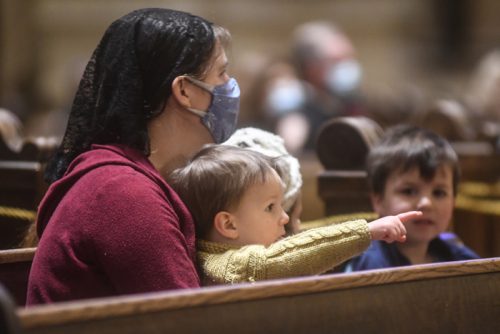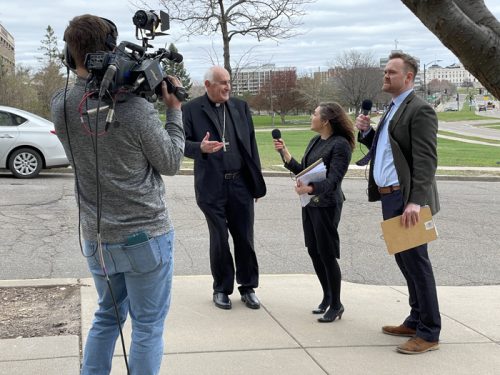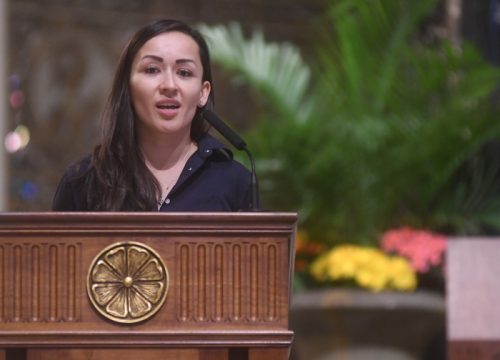In his most recent encyclical, “Fratelli Tutti,” Pope Francis lays out a vision of the Gospel in which human dignity is respected and everyone lives as sisters and brothers. This vision includes a call to action, according to Los Angeles Archbishop Jose Gomez.
“The pope wants the Church to be the vanguard in society, to help our neighbors to see that we are called to create a shared community in which every human person is cherished and respected,” Archbishop Gomez said April 15 in his keynote address delivered via Zoom for this year’s Catholics at the Capitol event.

The Catholic vision of social justice is rooted in building a society in which people love and take care of one another, said Archbishop Gomez, who serves as president of the U.S. Conference of Catholic Bishops.
“Friends, our task in this moment is to bring this beautiful vision to our public discourse, to awaken this awareness of God’s love in the hearts of our brothers and sisters,” he said. “We also have, in this moment, an important duty to be peacemakers and reconcilers. We need to help bring people together and help them realize our common humanity.”
The daylong event moved to a virtual format due to security and other concerns following the police shooting of Daunte Wright in Brooklyn Center April 11 and five subsequent nights of protests.
Archbishop Gomez said the people of his archdiocese and the nation’s bishops were praying for the Church in Minnesota during this challenging time.
“We pray for peace and we pray for justice, and we pray for the families of all those involved in the latest violence,” he said. “Please know that the Church remains committed to providing long-term leadership in the struggle against racism throughout the United States.”
About 800 people registered for the online event, which included students from several area Catholic high schools. In addition to Archbishop Gomez, participants heard an address from Obianuju Ekeocha, founder of Culture of Life Africa, and received issue briefings on a few legislative priorities identified by the Minnesota Catholic Conference, the official public policy voice of the Catholic Church in the state which organized the event.
They also heard a panel discussion with Speaker of the House Melissa Hortman and House Minority Leader Kurt Daudt. Participants planned to meet the next day with local legislators via Zoom.

Catholics at the Capitol began with a morning Mass at the Cathedral of St. Paul in St. Paul, where Archbishop Bernard Hebda was joined by St. Cloud Bishop Donald Kettler, New Ulm Bishop Emeritus John LeVoir, St. Paul-Minneapolis Auxiliary Bishop Andrew Cozzens, and Father James Bissonette, administrator for the Diocese of Duluth.
In his homily, Archbishop Hebda offered a framework for Catholic action in the public square, citing Pope Francis among other sources.
The pope speaks of politics “as a lofty vocation and one of the highest forms of charity in as much as it seeks the common good,” the archbishop said.
“Our focus today at Catholics at the Capitol, not surprisingly, is going to be on helping those in need, of transforming society in a way that serves the common good by lovingly calling to the forefront the needs of those most vulnerable and holding up the dignity of each human life,” he said.
Legislative priorities

Interspersed throughout the day were issue briefings presented by the bishops and policy experts. The topics addressed were:
• Recreational marijuana: Catholics are urged to oppose bills — H.F. 600 (Winkler) and S.F. 757 (Franzen) — that would create a commercial recreational marijuana industry in Minnesota.
Addressing participants, Bishop Cozzens said the bills would introduce another vice into society that will lower public morality and harm people, especially young people. Despite the claims made by some proponents of the legislation, Bishop Cozzens and others who spoke on the issue noted that, in states where legalization has occurred, arrest rates have increased, youths readily have access to the drug, and road safety suffers.
“Today’s marijuana is not the marijuana of the past,” said Kevin Sabet, president and CEO of Smart Approaches to Marijuana and former drug policy adviser in three U.S. presidential administrations. “We’re talking about something that’s 10 to 30 times stronger than it used to be.”
“Our young people are struggling,” Bishop Cozzens said. “Our young people are living in a very difficult world. The COVID-19 crisis has simply made that worse. We all know that anxiety, loneliness and depression are on the rise among our young people. The studies show that marijuana use increases the risk for suicide and depression among young people.”
• Immigrant driver’s licenses: Alejandra Chavez-Rivas identified herself as a recipient of DACA, the Deferred Action for Childhood Arrivals program that protects young people who qualify from deportation. Chavez-Rivas was born in Mexico and came to the U.S. with her siblings at age 5 when her mother left a desperate economic situation and crossed the border with them.

When she turned 16, Chavez-Rivas couldn’t get a job or driver’s license because of her status. In 2012, DACA allowed her to attend college. But her DACA status was not renewed under the Trump administration, and she lost her license and jobs that made it possible to attend the University of St. Thomas in St. Paul and care for a daughter. Living in Monticello, she would drive to St. Paul every day without a license and would pray to Mary to “cover me under her mantle to protect me as I made the commute to and from school.”
“I knew if I got pulled over by the police for anything, I would be detained and face deportation proceedings,” said Chavez-Rivas, who has since graduated from St. Thomas and had her DACA status renewed. It must be renewed every two years and does not clear a pathway to citizenship. That path has been hard to secure under current immigration policies.
“I stand here today to advocate on this issue and the need to legalize licenses for all and to push for immigration reform,” she said.
H.F. 1163 (Winkler) would create an opportunity for undocumented immigrants to learn the rules of the road and take a driving test in order to receive a noncompliant driver’s license enabling them to legally drive, helping them to meet their daily needs without the fear of family separation. It would not allow the holder to board a flight, enter federal buildings or be used for any other official purposes.
“We need to lessen the fears that our immigrant people have on a daily basis and always work so that separation of family members never happens,” Bishop Kettler told participants. “Our country was founded and developed by immigrants. I hope we will do today what others did for us years ago.”
• Prenatal rights: Attendees were encouraged to oppose H.F. 259 (Morrison) and S.F. 731 (McEwen), the “Protect Reproduction Options Act.” This legislation would do three things, according to Jason Adkins, MCC executive director: enshrine in our law and statutes a “right to abortion” in all stages of fetal development, it would overturn existing laws and protections that safeguard women’s health and ensure they’re making an informed decision, and leave an unborn child vulnerable to testing and experimentation.
Father Bissonette pointed to St. John Paul II’s encyclical “The Gospel of Life” for guidance: “Those means that respect the life and integrity of the human embryo directed toward its healing and survival are licit. But the use of human embryos or fetuses as an object of experimentation is a crime against their dignity as human beings and persons.”
Supplemental legislative materials made available online by MCC also addressed physician-assisted suicide, nonpublic education and education tax credits.
Staying connected

During a panel discussion, both Hortman and Daudt stressed the importance of constituents connecting with their elected representatives and forming a relationship with them.
“Each contact from somebody who lives in our legislative district is really meaningful,” Hortman said. “So it’s very well worth your time to send an email, or give a phone call, or try to go to a meeting in person where your state legislator is — town hall meetings which are currently on Facebook Live or Zoom. We are really led by the people of Minnesota and what they’re concerns are.”
“I always encourage people to have a relationship with their legislators,” Daudt said. “You never want the first time you meet your legislator to be when you’re knocking on their door asking for something. It’s always good if they know who you are and you’ve reached out to them before. … I can assure you they will be more likely to listen if you have some relationship with them.”
Following the day’s briefings and discussion, the event ended with Benediction and a blessing of the Capitol and the city.
To receive news and alerts on key issues impacting life, dignity, and the common good, and assistance with sending messages to lawmakers, sign up for MCC’s Catholic Advocacy Network at https://www.mncatholic.org/actioncenter/join-us.
Pictured at top: Bishop Andrew Cozzens, Auxiliary Bishop of the Archdiocese of St. Paul and Minneapolis, watches the keynote talk by Archbishop Jose Gomez of Los Angeles projected on a screen in the cathedral.






















